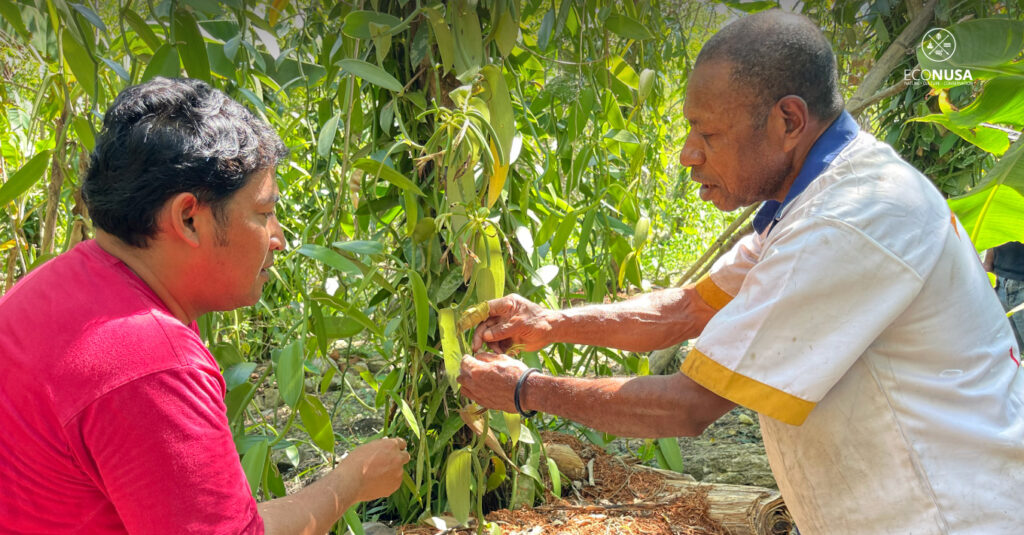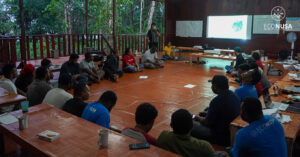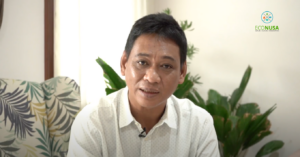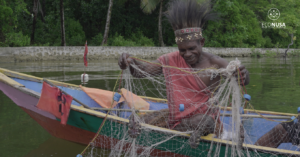
Keerom Regency in Papua Province has a variety of natural resources, including local food sources such as sweet potato (locally called hipere), taro, sago, gembili (Dioscorea esculenta), and jawawutor pokem (Papuan local wheat). Besides, all potentials here have not been managed, collected as data, and utilized optimally.
In the other hand, Keerom is also threatened by palm oil plantation investment. At least, as of the 16 villages assessed by EcoNusa, there are 9 palm oil companies obtaining licenses, despite the fact that not all has been operational. The fact shows that hundred thousands of hectares have been cleared for palm oil plantation. Those villages are located or shared their boundaries with concession areas. the condition has given quite serious social and economic impact to the community. They lost their livelihood. Their forests inherited by their ancestors in which they could hunt, crop sago, and seek water have now gone.
The stolen community rights have led a serious lost forests cover in Keerom. Data from the Global Forest Watch shows that Keerom has lost 36,200 hectares of forest cover in 2001-2020. The practice of transferring communal land right has sparked social tension, legal dispute involving clans in the Mamta/Tabi indigenous territories that consist of 87 tribes. Forest and land destruction remain happening today.
The indigenous community is vulnerable when they lost their living space and source of livelihood. EcoNusa in this respect had an initiative by building the capacity of local government and community to fabricate resilience in equitable and sustainable management of natural resources. One of the measures is by facilitating a Social Transformation School (STS) which involves the village heads and local cadres. For the reason, EcoNusa organized an early assessment by scoping 16 villages at 4 districts in Keerom Regency on 28 August up to 2 September 2022.
Exploring vanilla potential
Mathius Limbar, the head of Waley Village, Senggi District, Keerom Regency in Papua, gave positive response to EcoNusa’s initiative for the STS agenda. As to Mathius, by providing village cadre training, the community will obtain better knowledge on vanilla cultivation for the village. Besides, they will also have broader knowledge for the village potential development.
Furthermore, Mathius said that the village has thus far got a large amount of village fund. “I want to make use of the village fund for funding an activity that benefits many people and among others is by cultivating vanilla due to the promising yield,” said Mathius.
Vanji Dwi Prasetyo, EcoNusa’s Program Associate for Natural Resource Development Division, said that based on the field assessment, many of the local potentials have not been properly utilized because the locals have no knowledge on how to cope with germ and how to rejuvenate cacao trees.
Vanilla still looks decorative plants for the villagers fences as none has yet to know the cultivation technique. Uskwar Village, Manem District, once allocated vanilla seeds for community assistance. However, their productivity was poor. The locals acknowledged that they had never got any special training on vanilla cultivation. They learn from YouTube or ask other fellow farmers.
Most of villages in Keerom still faces clean water as problem. They simply rely on river and rain water. But on the other hand, the community is willing to also cultivate fisheries in their own ponds.
“The community expects that there will be a special class discussing the cultivation of vanilla with appropriate technique,” said Vanji. Vanilla has very appealing yields. Wet vanilla costs Rp500,000 per kilogram. Meanwhile, dry vanilla could cost Rp1 million per kilogram.
Based on the observation of EcoNusa scoping team, the community plants vanilla traditionally. “With the STS, the locals expect that they will get farming knowledge, particularly vanilla cultivation,” said Vanji. After STS, it is expected the locals will have proper knowledge on vanilla cultivation, self-sufficient plant seeds for the community, including the product marketing. Hence, vanilla, including cocoa and land fisheries, productivities will provide maximum benefits for the peoples’ welfare.
STS will involve 14 villages that expressed their interests, namely Waley, Warlef, Molof Villages in Senggi District, Arso Kota, Bagia, Workwana, and Sawanawa Villages in Arso District, Sawyatami, Wambes, Pyawi, Wembi, and Uskwar Villages in Mannem District, Sangke and Suskun Villages in Arso Timur District. Before STS, there will be Village Head Worskhop on 3-5 October, STS for Village Cadres on 6-10 October, and action plan on 11 October 2022.
Editor: Leo Wahyudi, Nur Alfiyah







